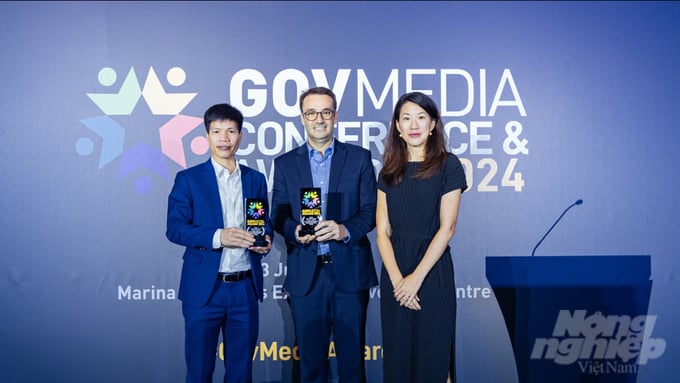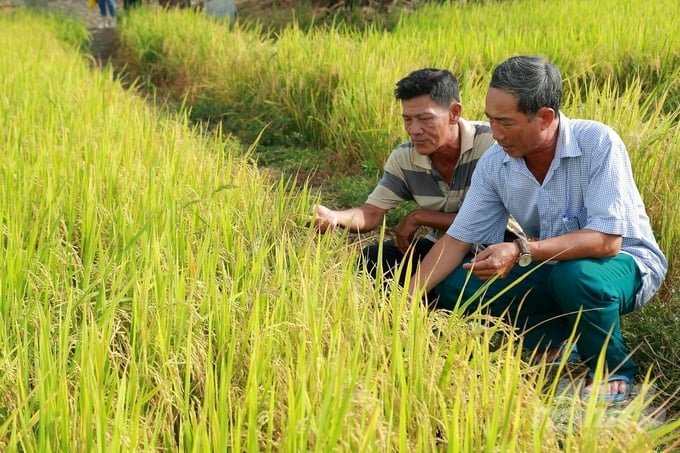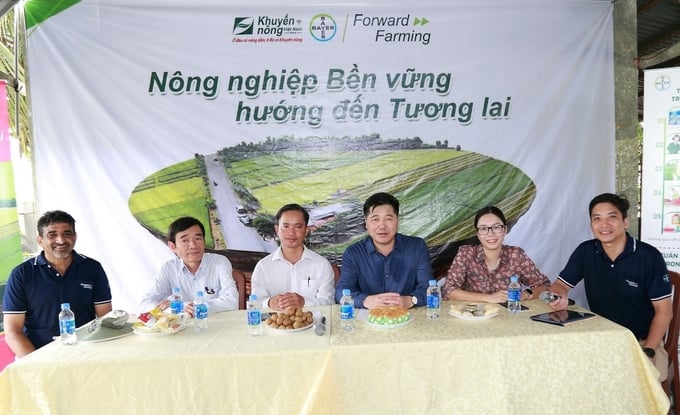November 27, 2025 | 16:06 GMT +7
November 27, 2025 | 16:06 GMT +7
Hotline: 0913.378.918
November 27, 2025 | 16:06 GMT +7
Hotline: 0913.378.918
This award signifies the accomplishment of the ForwardFarming model - Sustainable rice growing towards the future, which has been applied in Vietnam. The honor was given during the Seminar & GovMedia Awarding Ceremony held in Singapore.
The Conference and GovMedia Awards Ceremony seeks to recognize exceptional public-private partnership initiatives in Asia, specifically focusing on Vietnam's agriculture sector.
The GovMedia Awards Ceremony honors outstanding initiatives that synergize the efforts of the public and commercial sectors in Asian countries, resulting in beneficial results for local region. The 2024 awards were determined and assessed by a panel of judges consisting of professionals from Ernst & Young LLP, PwC Singapore, and KPMG.

Bayer and the National Agricultural Extension Center are honored to receive the Public-Private Partnership Award in the agricultural sector with the ForwardFarming initiative. Photo: Minh Anh.
Bayer and the National Agricultural Extension Center have received the prestigious "Public-Private Partnership of the Year" award. This award highlights their collective efforts in promoting for sustainable agricultural methods with the goal of fostering a successful future for farmers and communities throughout the entire rice-producing process.
The ForwardFarming approach, which emphasizes sustainable rice production for the future, was originally intended to be implemented as a three-year pilot project in Thoi Lai district, Can Tho city. Nevertheless, during only three cycles of rice cultivation, the model has attained noteworthy achievements, so indicating that the project is progressing in the correct direction. This achievement sets the stage for a viable future for rice cultivation and farming in Vietnam.
The ForwardFarming initiative was initiated in September 2023 as a joint effort between Bayer Vietnam, the National Agricultural Extension Center, and various key partners involved in the rice production value chain. The partners involved in this project consist of local Departments of Agriculture and Rural Development, local agricultural extension centers, the Mekong Delta Rice Institute, Saigon Kim Hong Trading-Service Company Limited, Binh Dien Fertilizer Joint Stock Company, Vinarice Company Limited, and several other organizations.

The results of the ForwardFarming farming model on experimental fields show that rice productivity increased, input materials were reduced, and sustainability indicators were also significantly improved. Photo: Minh Anh.
The objective of the three-year initiative is to enhance the efficiency of rice growing for Vietnamese farmers, while simultaneously reducing the negative effects on the environment. According to Farmer Do Tri Hung, who has been involved in the initiative for many crops, the ForwardFarming model has decreased the expenses for rice production by 1.5 to 4 million VND per hectare and boosted revenues by 13.1 to 54.9% compared to conventional farming techniques.
The Mekong Delta Rice Institute's surveys and measurements have shown that the ForwardFarming model's integrated solutions have enhanced rice growth and soil quality. This has resulted in a significant reduction in irrigation water usage, with a decrease of almost 50% (equivalent to 110 cubic meters per hectare) compared to previous farming methods. Significantly, this strategy has also decreased greenhouse gas emissions by 24.7% during production.
Furthermore, the project prioritizes the improvement of farmers' competence and understanding of sustainable farming through a variety of training programs. So far, more than 4,500 farmers in Can Tho, An Giang, and Kien Giang have received training in high-quality rice production, the efficient and responsible application of pesticides, and the implementation of emission-reducing methods that are appropriate for the local conditions and agricultural practices.

Bayer Vietnam and the National Agricultural Extension Center and partners in the rice production value chain discussed progress and solutions for developing the ForwardFarming model. Photo: Minh Anh
In early June, Bayer Vietnam, the National Agricultural Extension Center, and stakeholders in the rice production value chain convened to discuss the advancements and strategies for the "Sustainable Rice Farming for the Future - ForwardFarming" initiative. This encompasses the ongoing investigation, advancement, and assessment of technologies and remedies to enhance the quality of crops and mitigate environmental repercussions. It also involves broadening the network of strategic collaborators and providing training to farmers in An Giang, Kien Giang, and other provinces located in the Mekong Delta. The objective of these endeavors is to progressively contribute towards achieving the project's target of cultivating one million hectares of specialty rice with high quality and low emissions in the Mekong Delta region.
Translated by Linh Linh

(VAN) On the morning of November 27 in Beijing, Minister Tran Duc Thang and the Deputy Commissioner General of the General Administration of Customs of China signed a protocol on fresh jackfruit exports.

(VAN) As floodwaters recede, a vast network of irrigation works across eastern Gia Lai is emerging in a state of severe disrepair, with extensive damage demanding urgent restoration ahead of the 2025-2026 winter-spring cropping season.

(VAN) The conference reviewing three years of implementing Decision 911 identified the need to prioritize improving marine environmental quality and promoting sustainable fisheries development.

(VAN) Le Hoai Trung, Member of the Communist Party of Viet Nam Central Committee and Minister of Foreign Affairs, held talks with Vi Thao, Chairman of the Guangxi Zhuang Autonomous Region (China) this week.

(VAN) The Mekong River Commission adopts the 2026 - 2030 Strategic Plan with a people-centered approach.
/2025/11/26/1720-1-200855_132.jpg)
(VAN) Viet Nam and Japan have many conditions to expand cooperation on climate change adaptation, particularly in disaster risk management based on advanced technologies.

(VAN) The strong development of digital technology and artificial intelligence is opening up opportunities to transform science and technology into a 'Magic eye' for disaster forecasting and early warning.